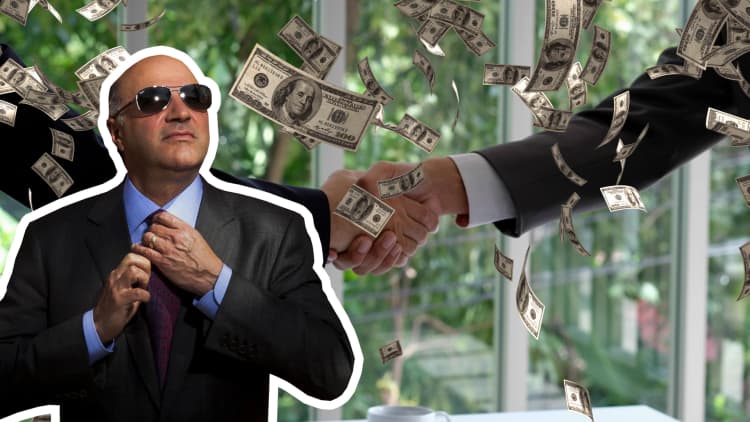The Mega Millions jackpot is now the seventh-largest in the game's history, worth $530 million. And after Friday night's drawing, one lucky winner could become an instant multi-millionaire.
If you hold the winning ticket, deciding what to do with your earnings isn't a simple process: It's important to properly protect yourself and your wealth.
Here's what five experts say to do if you win the jackpot.
Mark Cuban: 'Don't make investments'
Cuban, an investor on "Shark Tank" and owner of the Dallas Mavericks, says not to take the lump sum: "You don't want to blow it all in one spot," he told the Dallas Morning News in 2016. Instead, opt for the annuity plan.
From there, make sure to protect your winnings. "You don't become a smart investor when you win the lottery," he said. "Don't make investments. You can put it in the bank and live comfortably. Forever."
While it might be tempting to try and multiply your earnings, "you will sleep a lot better knowing you won't lose money," Cuban says. It's always risky to try and time the market and, if you go that route, you could end up losing everything.

Additionally, he says to be careful not let your loved ones turn you into a human ATM. "Tell all your friends and relatives no," he said. "They will ask. Tell them no. Feel free to help SOME, but talk to your accountant before you do anything."
Farnoosh Torabi: 'Take time to reflect'
When it comes to managing your winnings, don't do anything right away, Farnoosh Torabi, personal finance author and host of the "So Money" podcast, tells CNBC Make It.
"For at least a few weeks or a month, abstain from making any money moves with your winnings," she says. "It will likely be fueled by a lot of adrenaline and influence from friends, family and random wealth managers weighing in."
Before deciding what to do with the cash, you should "take time to reflect with your family on how you would like to make the most of this money to create a more fulfilling life, make an impact and — importantly — make it last."
Torabi also advises keeping the news to yourself, if possible. "To the extent that you can keep your winnings under wraps, I would," she says. "Don't announce to strangers or extended friends and family that you've won — at least not right away."
Keeping things private will help you avoid being bombarded with requests for money or unsolicited advice on how to use your earnings. "You want to be able to think through your next steps and be proactive, as opposed to reactive," Torabi says. "Take time to research the best plan and people to guide your financial decisions with your winnings."
Elizabeth Glasgow: You need to decide 'whether you trust yourself'
It's just as important to think about your personal money habits as it is to consider taxes when you come into a large windfall like a lottery win, Glasgow, a partner at McDermott Will & Emery who works with high net worth clients, tells CNBC Make It. "So often you hear stories of lottery winners who so quickly lose this wonderful opportunity that they've been given to have financial freedom because they have either spent too quickly or have been too generous."
When choosing between the annuity or lump sum, you need to decide "whether you trust yourself to manage your affairs on that kind of time basis versus getting it all at once."
For most people, it's also smart to work with trusted financial professionals who will ensure that you're compliant with your state's specific tax laws and help make the money last, Glasgow says.
And if you do decide to share your winnings with family or friends, it's important to understand the potential tax limits you could face. "In the U.S., each person can give $11.4 million away, free from the gift tax," which costs a percentage of every dollar above that amount, Glasgow says.
That means that your generosity could cost you: "If you had a big winning and say, 'Mom, I love you, here is your $20 million reward for having done so much for me in my lifetime,' while that was incredibly generous, it's important to understand that has a big gift tax consequence that you have to pay."
Kevin O'Leary: 'Don't screw it up!'
O'Leary, a financial expert and investor "Shark Tank," says to take the lump sum, don't spend it. "Pay yourself an annuity," he tells CNBC Make It, "and put the excess cash flow to work for you. More money up front means more money to invest and grow."

O'Leary recommends putting the money to work by investing in "low volatility, dividend paying stocks."
Like Cuban, O'Leary warns against making any risky moves with your winnings. It's not worth accidentally blowing it. "You've won financial freedom," he says. "Don't screw it up!"
Suze Orman: Ask yourself if you're able to 'manage your own guilt'
When choosing how to handle your lottery winnings, it's key to reflect on your own ability to manage money, Orman, personal finance expert, best-selling author of "Women & Money" and host of the "Women & Money" podcast, tells CNBC Make It. "To know where to invest hundreds and hundreds of millions of dollars is very difficult," she says.
"If you feel capable of investing it, if you feel capable of managing it, and you want to do that, take the lump sum," she says. That way, you're in control of your own money.
However, opting for the annuity is typically a smarter choice for the average person who doesn't have experience managing and investing significant sums of money, Orman says. It's especially important to think about how the windfall might impact your relationship with your friends and family.
"[If] you're surrounded by a family, by friends, by people that you are going to feel guilty that you have so much money and they don't, take the annuity," Orman says.
For the inexperienced, choosing to receive a set amount each year prevents you from being able to blow all of your earnings right away. "While you may think that you may never run out of money, that's not true," Orman explains. "If you don't feel like you can manage your own guilt, if you don't feel like you can manage that large of a sum of money because you have no idea who to trust, you have no understanding of money, you have no understanding of the market — simply take the annuity."
Like this story? Subscribe to CNBC Make It on YouTube!
Don't miss: Suze Orman: If you've done these 3 things, you're ready to buy a home



